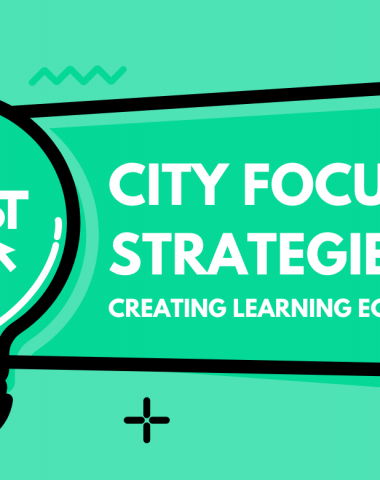Building a future in Vilnius: the importance of entrepreneurial skills
The city learning ecosystem refers to the collective network of institutions, programs, and resources that facilitate learning and development in urban environments. This ecosystem includes libraries, educational programs, NGOs, municipality bodies, universities, and businesses, among others. These actors play a crucial role in creating a vibrant learning ecosystem that fosters innovation and entrepreneurship.
From the national library to the municipality
One way to integrate entrepreneurial learning throughout the city learning ecosystem is to create a collaborative network of these actors. By sharing resources, expertise, and ideas, these organizations can work together to develop and implement entrepreneurial education programs that are accessible to everyone in the community. Vilnius is the city of learning that creates these networks.
Martynas Mažvydas National Library of Lithuania implements an innovative cultural education system. The system ensures cooperation between students and teachers, artists and creators, and offers a Cultural Passport tool allowing schoolchildren to attend cultural events at the expense of the state. With over 3 000 different literary and contemporary cultural events on offer, students can choose to participate in cultural heritage, ethnic culture, architecture, circus, ballet, cinema, puppet theater, drama theater, and more.
New cultural education system is created using blockchain technology, providing a unique opportunity for students to have a virtual wallet with cultural services allocated by the state. What is more, Open Badges is a part of cultural adventures.
“At the beginning, it was more like a game to get involved. We started everything with several partners, and now we’re testing the system with the idea of better cultural education in the future, but we have to unite our voices because small voices are not heard”, – shares Jolita Bečienė, Coordinator of Cultural Education.
The Vilnius municipality, Vilnius Youth Information and Volunteering Center and several partners are partnering to develop a new volunteering platform for the city. This platform aims to provide a comprehensive resource for young people who are looking to get involved in volunteer activities, while also offering opportunities for organizations and decision makers to better coordinate and manage volunteer efforts in the city.
The platform is designed to provide a centralized location for young people to find volunteer opportunities, learn about the benefits of volunteering, and track their progress and achievements in a digital format. With the inclusion of Open Badges system, volunteers are able to earn recognition for their achievements, which can be used to showcase their skills and experience to potential employers or academic institutions.
This new platform is especially important in a time when young people are often inundated with various informal educational opportunities and may not fully understand the benefits of volunteering. By providing a centralized and organized system, this platform can help young people to act purposefully and effectively in their volunteer efforts, while also preparing them for future career opportunities and helping them to gain a better understanding of themselves.
The Cities of Learning model is being used as a basis for the development of this platform. This model has been successfully implemented in other cities around the world, and aims to create a connected ecosystem of learning opportunities, skills development, and community engagement. By leveraging this model, the Vilnius municipality and Vilnius Youth Information and Volunteering Center hope to create a platform that is not only effective, but also sustainable and adaptable to changing needs and circumstances.
Overall, this partnership represents a significant step forward for the city of Vilnius in its efforts to support young people and foster a strong culture of volunteering. With this new platform, volunteers, organizations, and decision makers will be better equipped to work together and create meaningful change in their communities.
Micro-credentials for students
Another important discussion during the meeting was on the role of universities in promoting entrepreneurship. Participants acknowledged the significant role universities play in driving innovation and entrepreneurship. As the labor market undergoes continuous change, it is becoming increasingly important for students to develop new competencies, reskill and upskill in order to stay competitive and successfully build their careers. In response to this need, Mykolas Romeris University (MRU) has launched a transferable skills development program, called Micro-credentials / Skills Academy, aimed at providing students with the skills required to successfully integrate into the labor market and adapt to change.
Since the beginning of 2023, MRU has been developing a platform where students can find various trainings designed to develop transferable skills. The training areas cover a range of topics, including leadership, creativity, personal effectiveness, personal career management, stress management, and more. Each course lasts for 27 hours, with 8 academic hours allocated to classwork and 19 hours to self-study. Upon successful completion of the training, students are awarded a micro-credential (1 ECTS) in the form of a digital badge. Trainings take place in groups of up to 15 students, and are conducted by MRU professors. Social partners are also invited as guest speakers and contributors, adding value to the program with their expertise. It is worth noting that Skills Academy trainings are free for MRU students.
By participating in Micro-credentials / Skills Academy, MRU students can develop transferable skills that are in high demand in today’s rapidly evolving job market. The program provides an opportunity to develop new competencies, reskill and upskill, and stay ahead of the competition.
Final thoughts
The team of entrepreneurial explorers from the Netherlands, Curacao, Romania, Lithuania and Belarus who met in Vilnius also featured discussions on the importance of collaboration and networking in the learning ecosystem. Participants shared their experiences of collaboration and highlighted the benefits of working together, including access to funding, resources, and knowledge sharing. The importance of networking events and communities was emphasized, as they provide a platform for entrepreneurs to connect and learn from one another.
Finally, the meeting discussed the importance of measuring the success of the entrepreneurial ecosystem. Participants agreed that it is essential to have a system in place to measure the impact of initiatives and programs aimed at promoting entrepreneurship. This would enable stakeholders to make informed decisions and identify areas for improvement.
In conclusion, the meeting was a fruitful discussion on the state of the entrepreneurial ecosystem in Vilnius, Lithuania. Participants provided insights and recommendations on how to improve the ecosystem, including the need for a strong entrepreneurial culture, collaboration, and networking, and measuring success. It is clear that Vilnius has a vibrant entrepreneurial community, and with the right support and initiatives, it has the potential to continue to grow and thrive in the years to come.






Add Review